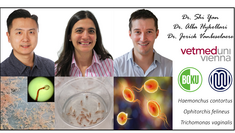2021: Research grants successfully approved in the field of Glyco-Parasitology
The year 2021 was particularly successful for three young researchers of the molecular glycobiology group. Due to the approval of three grants, the strong cooperation in Vienna involving the VetMed, MedUni and Boku Universities will be continued in the coming years.
A joint project led by Dr. Shi Yan and Dr. Katharina Lichtmannsperger (Vetmeduni Vienna) is about Haemonchus contortus, the most pathogenic blood-feeding nematode in sheep and goats. The common control strategy relying on anthelmintics has led to an increasing resistance to all drug classes in parasitic nematodes. In contrast, vaccination is a sustainable and effective approach to control H. contortus infection. In the past decades, scientists have discovered a number of native glycoproteins (proteins modified with sugars) in Haemonchus, which are capable of inducing immune protection in animals. In collaboration with Prof. Wilson, Dr. Yan’s team will focus on producing H. contortus glycoproteins using a glycoengineered cell factory so that the antigens carry similar sugar coats as native antigens. Efficacy of the recombinant antigens will be evaluated in a vaccine trial.
Ophitorchis felineus is a parasitic fluke, endemic in the Siberian area, which can cause severe diseases in the bile duct and liver system. The parasite`s success in infection is often linked with surface oligosaccharides presented to the host, however very little is known about the structure and functions of these molecules. Considering the disease severity caused by the parasite, which can even induce cancers such as cholangiocarcinoma, there is a great need to expand the knowledge on the glycoconjugate structures and their interaction with the immune system. In this “complex-study”, Dr. Alba Hykollari (Vetmeduni Vienna) and her international collaborators will employ a multi-omics approach to obtain comprehensive data from biological samples related to parasite infection. Together with Drs. Paschinger and Wilson as glycomics experts, Dr. Hykollari aims to highlight the relationships of the involved biomolecules and their functions.
Most recently, Dr. Jorick Vanbeselaere received his first 4-year research grant to conduct glycomics and glycoproteomics studies on Trichomonas. Trichomonas vaginalis and Tritrichomonas foetus are protist parasites which commonly infect the urogenital or digestive tracts of mammalian hosts leading to mild symptoms and increased risks of infertility, cancer, viral infection and adverse pregnancy outcome. Dr. Vanbeselaere will be investigating protein glycosylation of Trichomonas spp. via fine structural characterisation of the N- and O-glycans from several reference and clinical isolates. In addition to the -omics studies, he will prepare glycan microarrays in Prof. Wilson’s lab, which enables the studies on interactions between native Trichomonas glycans and carbohydrate binding proteins of the host innate immune system. This proposed research will be carried out in the Molecular Glycobiology & Glycophylogenetics group at the BOKU, in collaboration with various national and international partners, including Dr. David Leitsch at the Medical University of Vienna.
These cutting-edge projects deal with contrasting types of parasite (nematode, trematode and protist) and the interaction of parasite-specific glycans with hosts they infect - the three projects were approved by either the FWF or the University of Veterinary Medicine (the first call of Top Vet Science). As former and current postdocs, the grant recipients are happy to continue their fruitful collaborations with Prof. Iain Wilson's group at the Department of Chemistry at the BOKU.

